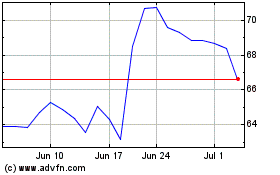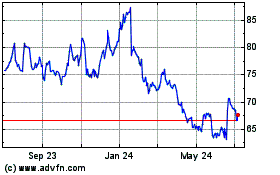Gilead Sciences Inc. (GILD) said a majority of hepatitis C
patients in one arm of a clinical trial had a relapse in their
disease after being treated with an experimental drug, raising
questions about the drug's potential and the $11 billion price tag
Gilead recently paid to obtain it.
Gilead shares plunged $8.29, or 15%, to $46.52 in recent trading
Friday. In comparison, shares of other companies developing
hepatitis C drugs surged, including Vertex Pharmaceuticals Inc.
(VRTX), Idenix Pharmaceuticals Inc. (IDIX), Achillion
Pharmaceuticals Inc. (ACHN) and Bristol-Myers Squibb Co. (BMY).
Gilead obtained the drug, GS-7977, with its $11 billion purchase
of Pharmasset last month. Gilead has billed GS-7977 as the anchor
of what the company expects to be the first all-oral regimen for
hepatitis C to reach the market, potentially in 2014, and analysts
have predicted the drug has multibillion-dollar annual sales
potential. Current standard treatments include an injectable
drug.
A clinical trial of GS-7977, titled "Electron," included an arm
testing the drug in patients with a form of hepatitis C known as
genotype 1, who had previously seen little or no decrease in the
virus after treatment with a regimen containing an older drug,
interferon.
Gilead said a majority of these patients experienced viral
relapse within four weeks of completing 12 weeks of treatment of
GS-7977 plus another drug called ribavirin.
Of the 10 patients enrolled in this segment of the trial, data
were available for eight, and among these, six had viral relapse,
Gilead said. Two patients haven't relapsed, but they have only
reached the two-week post-treatment time point, and it is possible
they could relapse.
Most Americans with hepatitis C have the genotype 1 infection,
which is the hardest to treat. Also, genotype 1 patients who didn't
respond well to interferon are particularly difficult to treat,
Gilead executives said Friday. Hepatitis C is an infection that
leads to inflammation of the liver, and can be transmitted sexually
or through shared needles.
The results released Friday show that GS-7977 plus ribavirin for
12 weeks in the genotype 1 patients who didn't respond well to
interferon was "sub-optimal," Norbert W. Bischofberger, Gilead's
executive vice president of research and development and chief
scientific officer, said on a conference call with analysts.
Gilead said the results suggest that additional antiviral drugs
may be necessary to effectively treat patients in this subgroup.
Gilead will explore various options to treat these patients,
including combinations with other orally administered
antivirals.
ISI Group analyst Mark Schoenebaum called the clinical data
"unquestionably bad news," and reduces the drug's potential in
treating genotype 1 patients.
He said, however, the drug's probability of success in treating
certain other genotypes remains unchanged.
GS-7977, formerly code-named PSI-7977, has shown positive
results in other genotypes of hepatitis C, including genotypes 2
and 3. Gilead executives said Friday the company remained on track
to apply for regulatory approval of GS-7977 to treat genotype 2 and
3 patients by mid-2013.
Results from ongoing studies of GS-7977, including those
involving genotype 1 patients who haven't previously been treated,
will be released in the coming months.
Companies are racing to get a new treatment on the market to
fight hepatitis C, which affects about 170 million people globally,
including an estimated four million Americans.
Last year, Vertex and Merck & Co. (MRK) introduced new
hepatitis C treatments that improved standard of care, but doctors
say even better treatments are needed. Market-research firm
Decision Resources estimates the global hepatitis C market will hit
$16 billion in 2015, up from just $1.7 billion in 2010.
The rising interest in hepatitis C set off a flurry of pricey
dealmaking. After Gilead bought Pharmasset for $11 billion,
Bristol-Myers agreed in January to acquire Inhibitex for about $2.5
billion.
The setback for GS-7977 could provide an edge for some of the
other hepatitis C drugs in development.
GS-7977 and some other hepatitis C drugs in development are
known as nucleotide analog polymerase inhibitors, or "nukes" for
short, which are generally designed to combat infection inside
liver cells. The setback for GS-7977 could cast a cloud on the need
for nukes as part of an all-oral therapy, JMP Securities analyst
Liisa Bayko wrote in a research note.
Achillion Pharmaceuticals' lead hepatitis C drug candidate, is a
nonnuke. Achillion shares jumped $2.02, or 23%, to $10.77
Friday.
However, even some companies developing nukes saw stock-price
gains Friday. Shares of Idenix rose 53 cents, or 4.6%, to
$11.99.
-By Peter Loftus, Dow Jones Newswires; 215-982-5581;
peter.loftus@dowjones.com
--Ben Fox Rubin contributed to this article.
Gilead Sciences (NASDAQ:GILD)
Historical Stock Chart
From Jun 2024 to Jul 2024

Gilead Sciences (NASDAQ:GILD)
Historical Stock Chart
From Jul 2023 to Jul 2024
